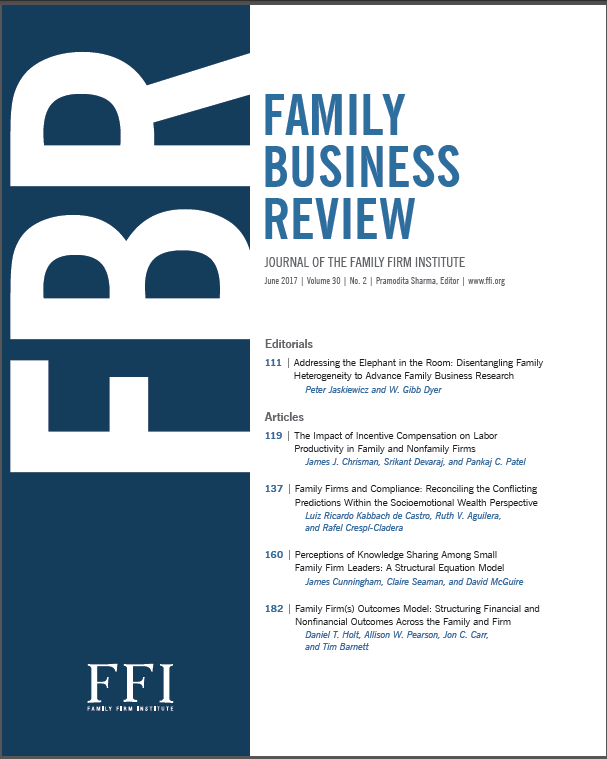家族企业中的亲属关系与性别:对员工组织公民行为的新认识
IF 5.6
1区 管理学
Q1 BUSINESS
引用次数: 11
摘要
我们通过引入亲属关系作为分类的一种新的人口学特征来扩展关系人口学理论。我们的理论认为,家族企业员工的亲属相似性(家庭与非家庭)、亲属关系(子女与其他家庭关系)和性别(女性与男性)对其组织公民行为(OCB)有独特的影响。从209个家族CEO -员工对中收集的数据表明,当利他主义领导行为高时,家族男性员工,尤其是CEO的儿子,表现出最高的组织公民行为,而女儿和其他女性家族员工则表现出一贯高的组织公民行为,这证实了员工在家族企业中的经历同时受到亲属特征和性别的影响。本文章由计算机程序翻译,如有差异,请以英文原文为准。
Kinship and Gender in Family Firms: New Insights Into Employees’ Organizational Citizenship Behavior
We extend relational demography theory by introducing kinship as a new demographic characteristic of categorization. We theorize that family firm employees’ kinship similarity (family vs. nonfamily), kinship tie (child vs. other familial relationship), and gender (female vs. male) uniquely affect their organizational citizenship behavior (OCB). Data collected from 209 family CEO–employee dyads indicate that male family employees, especially sons of the CEO, display the highest OCB when altruistic leadership behavior is high, whereas daughters and other female family employees display consistently high OCB, confirming that employees’ experiences in family firms are simultaneously shaped by their kinship characteristics and gender.
求助全文
通过发布文献求助,成功后即可免费获取论文全文。
去求助
来源期刊

Family Business Review
BUSINESS-
CiteScore
12.40
自引率
13.60%
发文量
13
期刊介绍:
Family Business Review (FBR) has been a refereed journal since 1988, serving as the premier scholarly publication dedicated to the study of family-controlled enterprises. It delves into the dynamics of these businesses, encompassing a range of sizes from small to very large. FBR concentrates not only on the entrepreneurial founding generation but also on family enterprises in subsequent generations, including some of the world's oldest companies. The journal also publishes interdisciplinary research covering families of wealth, family foundations, and offices.
 求助内容:
求助内容: 应助结果提醒方式:
应助结果提醒方式:


